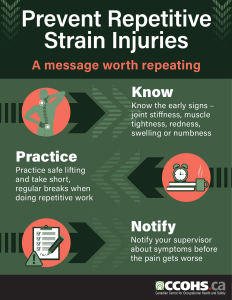Written by Chris Taylor, National Practice Leader, Occupational Health & Safety, Pinchin Ltd.
February 29th is Repetitive Strain Injury (RSI) Awareness Day (on leap years it’s February 29th, as a non-repetitive day).
About RSIs
RSI stands for repetitive strain injuries. Also known as musculoskeletal disorders (MSDs), RSIs are an umbrella term used to describe a family of painful disorders affecting tendons, muscles, nerves and joints in the neck, upper and lower back, chest, shoulders, arms and hands.
RSI Point of View
I think more and more people are aware of what RSIs are, but this is a great opportunity to add some additional focus. One of the outcomes of the pandemic has been more and more people working from home. Many organizations (including Pinchin) have adopted flexible work schedules to allow for staff to work from home. Although this has been a benefit to many workers, particularly those with children, has reduced costs based on fewer commutes, etc, but has led to some significant increases in RSI potential.
When at the office, we are typically working on desks or other workstations that were designed to reduce the risk of RSIs – proper heights, good lighting, proper chairs, etc. Then we moved home.
How many of you, particularly during the early days of the pandemic, were working off your kitchen table? For over a year, I worked on a card table, with a TV tray side table – and I should know better. These were not work-stations. Yet, many of us continue to work in inadequate environments, just to keep the ability of working from home. Here are some telling statistics from ergonomicsHelp online magazine:
- According to a survey, out of 856 people working remotely, 40% of them aren’t even working from a dedicated desk; about 20% of people are working from the living room;
- 30% of people reported working from their own bedroom;
- 15% of those surveyed were working at their dining table and 11% were working on their couch;
- 60% were unable to bring equipment from the employer;
- and employees reported spending an average of $194 on supplies specifically related to remote work.
All these aspects are driving up RSI potential – which has huge impacts on employee satisfaction, let alone potential lost-time for employers.
And work from home is still work – what are the employer responsibilities, given that in many cases the idea of working from home is not the employer’s idea, but the employees?
This is the value of an awareness day and campaign – as a safety professional within your organization you can use this day to push out useful resources for your work-from-home employees.
The Canadian Centre for Occupational Health and Safety (CCOHS) has a wide variety of freely available resources to help you build your campaign in reducing RSIs. You can access their free resources here:
CCOHS: International Repetitive Strain Injury (RSI) Awareness Day

Prevent RSI poster from Canadian Centre for Occupational Health & Safety (CCOHS)
But what other things can a safety professional do to support their remote workers (and not just buy everyone an adjustable desk for their home)?
Schedule a Video Review – arrange a time to review the working environment of your remote worker virtually by having them move their camera around their workspace. Look for those key items that can be easily adjusted and use the time to have a conversation about ergonomics.
Highlight Workstation Basics – schedule a virtual session for your remote workers (and record for others to see on their own time) and demonstrate key adjustments to make when working in a home environment. And point everyone to those freely available online resources.
Recommend the OSHA eTool – don’t let the American aspect stop you from using this fabulous online tool from OSHA that workers can use at their own time and pace: eTools : Computer Workstations | Occupational Safety and Health Administration (osha.gov)
If like Pinchin, your company is allowing or encouraging a blended work environment, don’t leave your workers hanging that are working from home. It doesn’t have to be about gazillion dollar workstations – just an increase in awareness and perhaps some coaching – good luck!
Source: Repetitive Stress Injuries (RSI) – Everything You Need To Know, TRI PT Brooklyn, 2023
If you like to learn more about how our Occupational Health & Safety Group can help you and your business, contact me or your local Pinchin office.